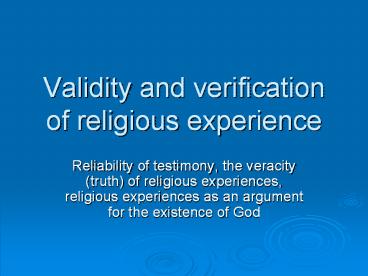Validity and verification of religious experience - PowerPoint PPT Presentation
1 / 15
Title:
Validity and verification of religious experience
Description:
Validity and verification of religious experience Reliability of testimony, the veracity (truth) of religious experiences, religious experiences as an argument for ... – PowerPoint PPT presentation
Number of Views:289
Avg rating:3.0/5.0
Title: Validity and verification of religious experience
1
Validity and verification of religious experience
- Reliability of testimony, the veracity (truth) of
religious experiences, religious experiences as
an argument for the existence of God
2
Review
- How do religions determine whether a religious
experience is true or false? - List
3
How many of these did you get?The Bible offers
some good advice
- Emphasis on the commitment of the person not the
feelings or emotions. - Produces an improvement in the individuals life.
- Leads to action against social wrongs.
- Leads to humility.
- Is marked by leadership that guides (not
controlling). - Believes regardless of miracles.
- Is consistent with the message of the scriptures.
4
- Correct these sentences
- William Otto performed experiments with cocaine
and tranquilisers that produced results very
similar to religious experiences - Research done by Hulls Religious Experience
Research Unit (published 1987) indicated that up
to 20 of people in the UK had been aware of a
presence or power beyond themselves. - These results tend to suggest that visionary
or musical experiences are actually normal.
5
- William James performed experiments with nitrous
oxide and anaesthetics that produced results very
similar to religious experiences - Research done by Oxfords Religious Experience
Research Unit (published 1987) indicated that up
to 80 of people in the UK had been aware of a
presence or power beyond themselves. - These results tend to suggest that visionary
or mystical experiences are actually normal.
6
- Reliability of Religious Experience
- The Argument from Religious Experience claims
that religious experiences prove the existence of
God, and we can do that too. - Richard Swinburne used two principles to argue
the case for religious experiences - Principle of Credulity if a person says they
have experienced something, they probably have. - Principle of Testimony unless someone is
totally unreliable or a liar their description is
probably true.
7
Disputing the reliability of Religious
ExperiencesCaroline Franks Davis
- Challenges to description describing an
experience of God is describing something which
is unable to be proved, as the person cannot
understand it cannot have been God. - Challenges to subject claims are evidence of
mental illness so the person is unreliable many
religious experiences seem to be internal and so
not necessarily dependent on an external being
(like God). - Challenges to object did the person also see
aliens or flying pigs? - Challenges to conflicting claims all religions
claim to be true, so which one is?
8
Feuerbach who inspired Marx
- Ludwig Feuerbach (1804-1872) held that, in order
to make us feel secure in an uncertain universe,
our imagination projects into heaven an ideal
picture of ourselves (a personality that is all
knowing, all-powerful, all good and all-loving),
calls it God and then bows down and worships it.
- Religious experiences are in our own minds and
imaginations In the consciousness of the
infinite, the conscious subject has for his
object the infinity of his own consciousness
9
David Hume (1711 1776)
- What greater temptation than to appear a
missionary, a prophet, an ambassador from
heaven? - Hume states that some people will take advantage
of our desire to believe by producing false
testimony. - For example - ?
10
furthermore, says Hume
- How can testimony be reliable when religious
experiences are dissimilar to each other some
speak of God, others of Allah, of Brahman, of
Nirvana and so on.
11
The Hard Attitude
- Terence Penelhum, maintains that there can be no
natural theology based on experience. He says
that if there were never any alternative
explanations other than they are explanations of
God there could be such a natural theology. But
alternative explanations are always available - Eg. Can you think of a New Testament miracle
that we could use as an example
12
The Soft Attitude
- John Hick and Richard Swinburne
- maintain that someone who has a powerful sense of
existing in the presence of God will, as a
rational person, claim to know that God exists
13
- Such a person would be as entitled to make this
claim as others are to claim that the physical
world and other people exist (ie. It is no more
irrational to claim that I have, as a rational
person, experience God than it is to claim that I
have experienced visiting New York or that I have
met the Queen).
14
Homework
- The efficacy of prayer
- Does God intervene in the world in response to
prayer? - What can you find out?
- Also - revision notes for Validity and
Verification of religious experience essay
after half term
15
- Teresa of Avila































